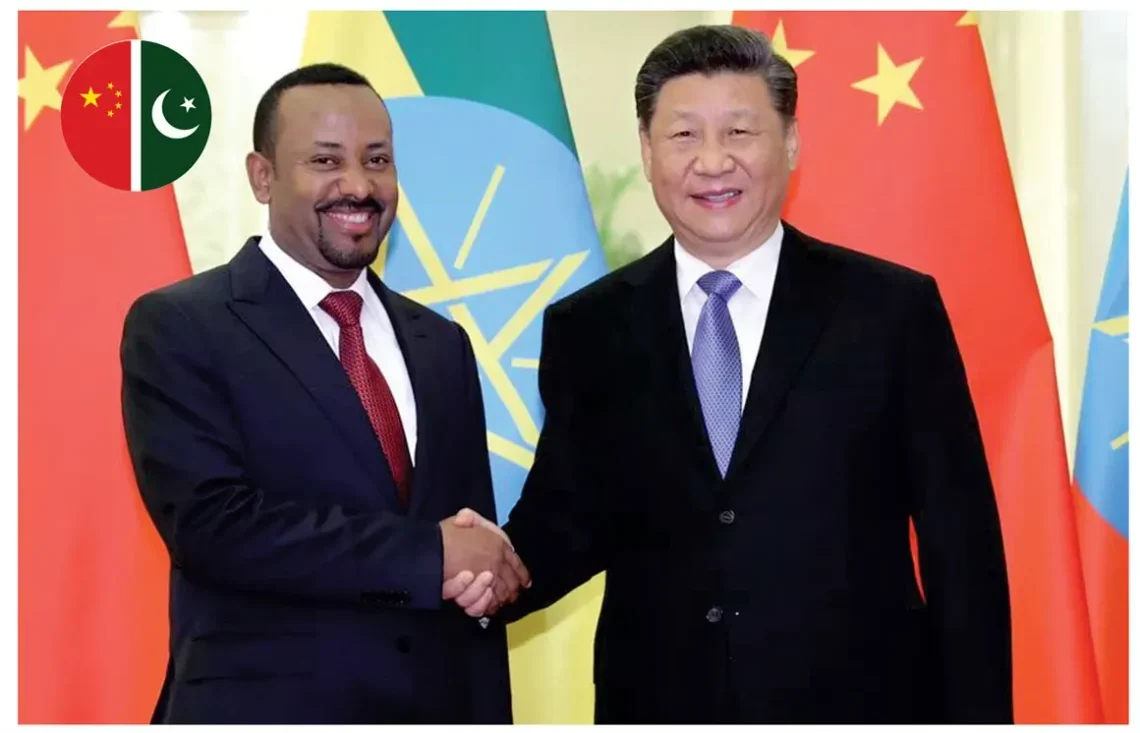
By: Dr Mehmood Ul Hassan Khan
The Chinese One Belt & One Road Initiative (BRI) has entered into its Phase 2. According to numerous independent reports the BRI 2.0 has brighter prospects in terms of further expansion, scope, utility and multidimensional trans-regional connectivity in the next decade.
The BRI represents the Chinese president Xi’s extraordinary vision, transcends borders, connects continents, and fosters economic cooperation on an unprecedented scale in the world. It is indeed a testament to the Chinese shared commitment to progress and mutual prosperity.
Ethiopia is the pioneer of China-Africa cooperation and connecting hub of the BRI in Africa. The Chinese government is ready to support Ethiopia’s aspiration to develop through the BRI and other development initiatives.
Evidently, Ethiopia and China steadily promote high-quality BRI development and has also initiated meaningful cooperation under the Global Development Initiative (GDI) and pushed forward the implementation of the Nine Programs under Forum on China-Africa Cooperation which is now paying its dividends for both the countries.
By virtue of its rich mineral, metal, agriculture, infrastructure development, blue economy and above all industrialization and human capital the African continent has become hope of the future global development. According to Prime Minister of Ethiopia Abiy Ahmed Ali Africa is going to become an economic, political and social powerhouse. Thus role of Ethiopia is immense in the further expansion of the BRI in Africa.
In this regard, the Federal Democratic Republic of Ethiopia is the window of greater regional connectivity, food security, promotion of renewables and minerals & metals exports to the outer world. Moreover, interestingly, the aging population of European Union and ASEAN has also increased influx of its human capital in the global countries and communities in the future.
According to many published reports, the real GDP growth of Ethiopia will be 6 percent during 2023, up from an estimated 4.4 percent in 2022. It has driven primarily from strong fixed investment following the end of the conflict in Tigray. Actually it has surpassed many regional countries (GDP) during 2023.
Hopefully, in 2024, it would further accelerate up to 6.8 percent as private consumption picks up, and as foreign investment inflows increase. Ethiopian inclusion in the BRICS has also further enhanced its economic potential and global reach which is good omen for its macro-economy stimulating its massive drive of industrialization and infrastructure development.
Furthermore, close cooperation on technical and vocational education and training (TVET) has become important for high-quality China-Ethiopia cooperation under the BRI. It would be a giant step towards achieving the desired goals of capacity building mechanism.
It seems that Ethiopia is keen to deepen TVET collaboration with China to attain the much-needed human resource capabilities and eventually a skilled workforce adaptable to the ever-evolving demands of the global job market in the days to come.
It would play an important role in the implementation of infrastructure and other socio-economic development projects under the China-proposed BRI.
The Ethiopian government strongly emphasizes the role of the TVET sector in generating the desired trained workforce to support current and future investments across all development sectors in the country, including agriculture, infrastructure development, manufacturing, service and other development sectors.
It has produced well-trained human resources in Ethiopia, contributing to the sector’s development. The Ethiopian government is currently reforming the education and training sector to improve its quality and relevance to the labor market.
In its BRI cooperation with China, a host of crucial infrastructure development projects in Ethiopia, ranging from roads, railways, industrial parks, energy development projects to export-oriented industries, have yielded tangible results.
The China-Ethiopia BRI cooperation has been wide-ranging, fruitful and pace-setting in Africa. The two sides have successfully established the all-weather strategic partnership.
The Chinese president Xi emphasized that China supports Ethiopia in safeguarding its sovereignty, security and development interests. China is ready to work with Ethiopia to strengthen practical cooperation in various fields under such frameworks as the BRI and the Forum on China-Africa Cooperation, support and participate in Ethiopia’s post-war reconstruction and economic revitalization, strengthen cooperation in green development, and implement the Global Development Initiative to boost Ethiopia’s development effort.
Ethiopia expressed strong endorsement of the Belt and Road Initiative, which has borne substantial results due to fruitful collaboration with China, at the Ethiopia-China investment forum held in Beijing during October 2023.
More than 400 delegates from Ethiopia and China rigorously came together to delve into deeper cooperation and shared development in the forum themed “Exploring Untapped Investment Potential in the Heart of Africa.” Ethiopian officials presented the most recent advancements and investment possibilities in sectors such as infrastructure, mining, and energy.
Interestingly, Ethiopia attributes its double-digit growth in the past decades to investment from China. China and the BRI has revolutionized the infrastructural development in Ethiopia and now these investments are booming in shape of building roads, bridges and railways. Moreover, the BRI has been one of the main players of achieving boom in infrastructure development and the manufacturing sector and also created abundant job opportunities for Ethiopian youth in the last ten years.
On its part, the Ethiopian government had outlined five priority investment sectors for bilateral cooperation, including agriculture and agro-processing, manufacturing, tourism, information communication technology, and the mining sectors and the BRI has further furnished potential of these important sectors of its economy.
The BRI has become an open and inclusive, mutually beneficial and win-win international cooperation platform between China and Ethiopia. It has effectively supported and streamlined its national transportation system which is now contributing to its regional connectivity and national income and GDP growth.
In this connection, the 752.7-km Chinese-built Ethiopia-Djibouti standard gauge railway, also known as the Addis Ababa-Djibouti railway, has now become iconic mega project of the BRI which has also injected a crucial impetus to Ethiopia’s development aspirations.
Moreover, the Addis Ababa-Djibouti Railway is not only a transportation line but also a transformative transport economic corridor and a road to socio-economic prosperity. Obviously, it has opened up a railroad corridor to the sea for Ethiopia, effectively driving the development of industrialization and urbanization along the route.
In summary, the bilateral relations between Ethiopia and China are complementary, translating opportunities into real potentials and real potentials in to real seas of progress and prosperity. The Chinese BRI has become a mutually beneficial cooperation platform advancing socioeconomic development in Ethiopia and beyond.
It is suggested that the speed and magnitude of implementing the Belt and Road Initiative should be further streamlined, systemized and strengthened between Ethiopia and China which would open new avenues of mutual cooperation and collaboration in terms of health, vaccine cooperation, digitalization, e-commerce, Artificial Intelligence, qualitative industrialization, green energy transformation, rural revitalization, disaster management, EVs, SMEs, banking & finance cooperation, exploration of minerals & metals and above all nurturing of human capital.
Author is Executive Director at The Center for South & International Studies (CSAIS) Islamabad &
Regional Expert on China, CPEC & BRI


